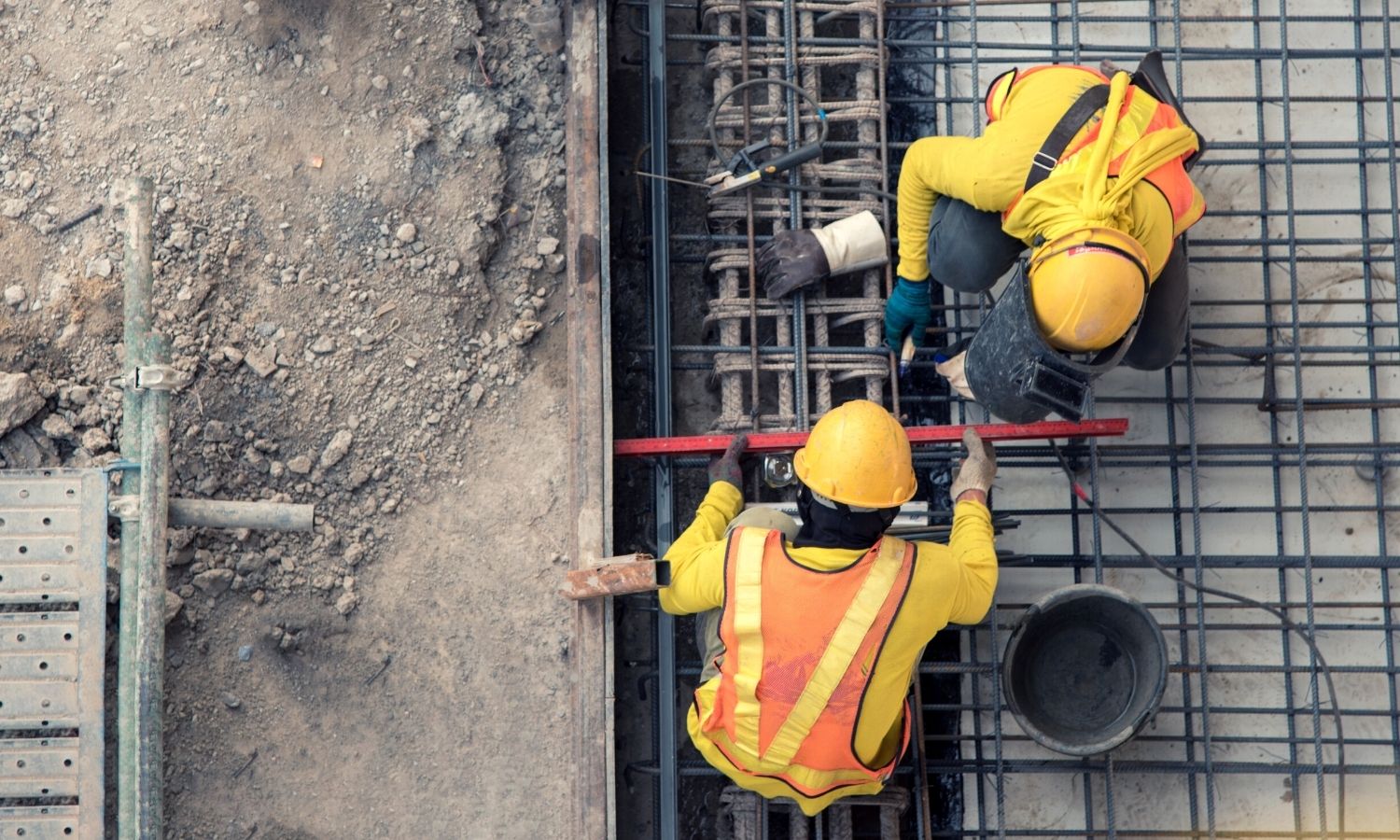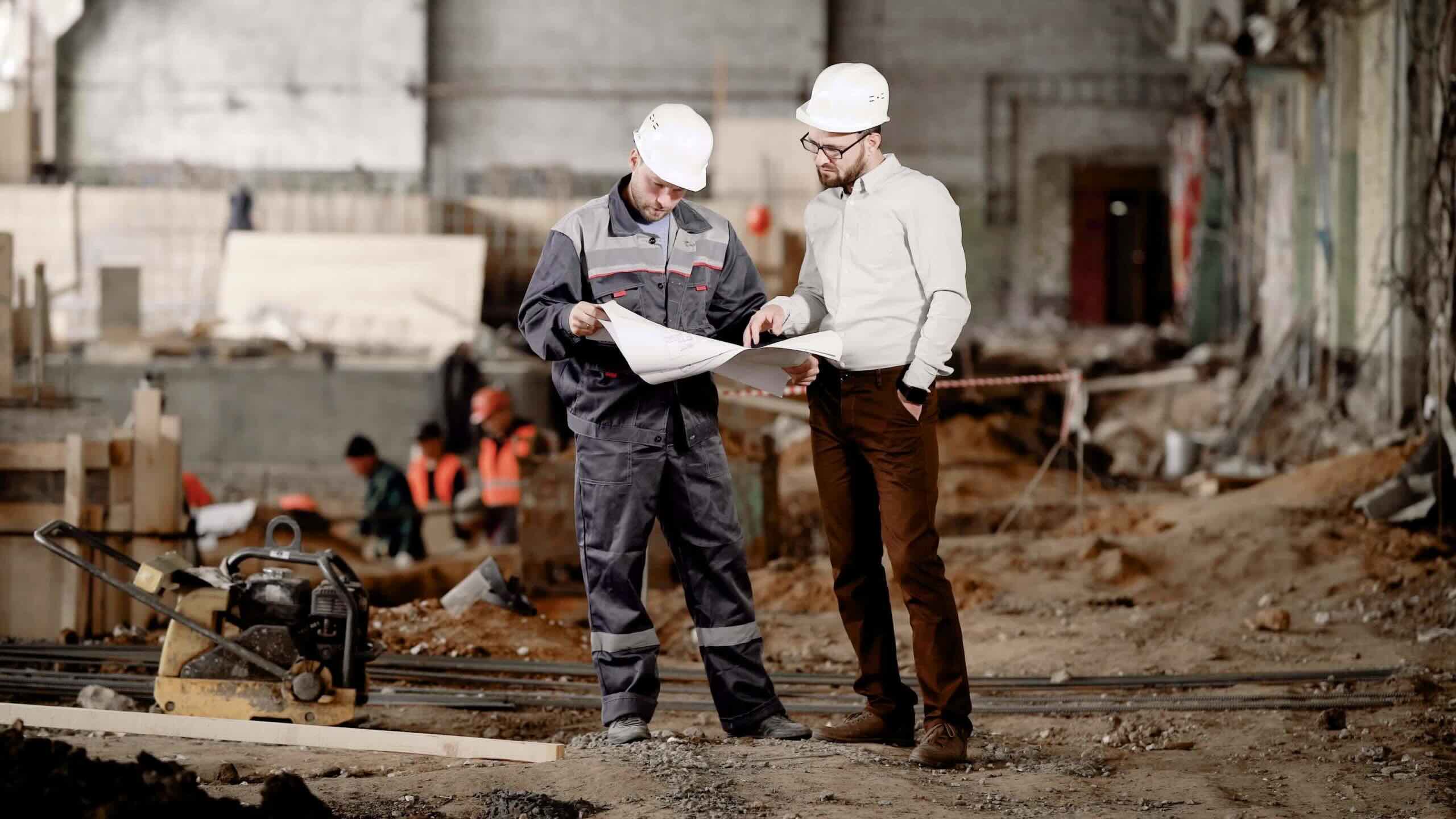Home>diy>Building & Construction>How Much Do Construction Supervisors Make


Building & Construction
How Much Do Construction Supervisors Make
Modified: January 4, 2024
Learn the average salary range for construction supervisors in the building construction industry. Explore the earning potential of construction supervising roles in this comprehensive guide.
(Many of the links in this article redirect to a specific reviewed product. Your purchase of these products through affiliate links helps to generate commission for Storables.com, at no extra cost. Learn more)
Introduction
Construction supervisors play a vital role in the building industry, ensuring that projects are executed safely, efficiently, and according to the plans and specifications. As a construction supervisor, you are responsible for overseeing the day-to-day operations on construction sites, coordinating and managing the work of various tradespeople, and ensuring that projects are completed on time and within budget.
But how much do construction supervisors make? Salary is an important consideration for anyone pursuing a career in the construction industry. It is influenced by several factors, including experience, education, location, and the industry sector in which you work.
In this article, we will explore the factors that influence the salaries of construction supervisors, as well as provide information on the average salary range and the highest-paying industries. We will also discuss how location and experience can impact earning potential, the education and certification requirements for construction supervisors, and the benefits and perks that often come with the position.
Whether you are a seasoned construction supervisor looking to negotiate a salary increase or someone considering a career path in construction supervision, this article will provide you with valuable insights into the earning potential and job outlook for construction supervisors.
So, let’s dive in and explore the world of construction supervisor salaries.
Key Takeaways:
- Construction supervisor salaries are influenced by experience, education, industry sector, location, and specialization. Entry-level supervisors can earn $50,000-$65,000, while senior-level supervisors can command over $90,000 annually.
- The construction industry offers competitive salaries, benefits, and a positive job outlook for supervisors. Industries such as oil and gas extraction, engineering services, and renewable energy construction provide higher salary potential.
Read more: What Is A Construction Supervisor
Factors Influencing Construction Supervisor Salaries
The salary of a construction supervisor can be influenced by various factors that are taken into consideration by employers when determining compensation. Understanding these factors can help you gauge your earning potential and negotiate a fair salary. Here are some key factors that can influence construction supervisor salaries:
- Experience: One of the primary factors that impact construction supervisor salaries is the level of experience. As with most professions, the more years of experience you have, the higher your earning potential. Construction supervisors with extensive experience are often sought after for their seasoned leadership skills, ability to handle complex projects, and proficiency in managing teams. However, it is important to note that even entry-level construction supervisors can earn a decent salary if they possess other valuable skills or qualifications.
- Education and Certifications: While not always a requirement, having a formal education or relevant certifications in construction management or a related field can significantly boost your earning potential. Employers often value candidates who possess a mix of practical experience and theoretical knowledge as it demonstrates a well-rounded skill set. Certifications such as the Certified Construction Manager (CCM) or the Project Management Professional (PMP) can validate your expertise and make you more competitive in the job market, potentially leading to higher salaries.
- Industry Sector: The industry sector in which a construction supervisor works can have a significant impact on their salary. Different sectors, such as commercial construction, residential construction, civil engineering, or infrastructure projects, have varying demand for construction supervisors and different levels of complexity. Generally, sectors that involve larger and more complex projects tend to offer higher salaries compared to smaller-scale projects. It is worth noting that high-demand sectors, such as renewable energy or healthcare construction, may offer greater earning potential due to specialized skills and certifications required.
- Location: The geographic location of a construction supervisor’s employment can also influence their salary. Construction markets and cost of living vary across different regions and cities. For instance, construction supervisors working in metropolitan areas or cities with a high cost of living often command higher salaries compared to those working in rural or less populated regions. It is essential to consider the regional construction demand, market competitiveness, and industry standards within your desired location when assessing salary expectations.
- Skills and Specializations: Construction supervisors who possess specialized skills or knowledge in certain areas of construction can often negotiate higher salaries. For example, expertise in green building practices, LEED certification, or proficiency in using advanced construction management software can make you a desirable candidate and potentially earn you a higher salary. Additionally, strong communication, problem-solving, and leadership skills are highly valued in construction supervisors and can also impact salary offers.
Keep in mind that while these factors play a significant role in determining construction supervisor salaries, individual negotiation skills and the specific needs and policies of the employing company also come into play. It is essential to research and gather data on industry salary trends, conduct informational interviews, and be prepared to tailor your salary expectations accordingly.
Now that we have explored the various factors influencing construction supervisor salaries, let’s take a look at the average salary range you can expect in this field.
Average Salary of Construction Supervisors
The average salary of construction supervisors can vary depending on several factors, including experience, education, certifications, industry sector, and location. While there is no one-size-fits-all answer to what construction supervisors make, we can provide a general overview of the average salary range based on available data.
According to the U.S. Bureau of Labor Statistics (BLS), as of May 2021, the median annual wage for construction managers, which includes construction supervisors, was $97,180. The lowest 10 percent earned less than $54,310, while the highest 10 percent earned more than $173,160. Please note that these figures represent data for construction managers as a whole, and construction supervisors’ salaries may fall within this range.
However, it is essential to keep in mind that these figures are national averages and can vary significantly based on factors such as experience, location, and industry sector.
With that in mind, let’s delve deeper into the salary range for construction supervisors:
- Entry-Level: Construction supervisors who are starting their careers can generally expect to earn salaries within the range of $50,000 to $65,000 per year. These positions may require less experience but could still offer opportunities for growth and advancement.
- Mid-Level: With a few years of experience under their belts, construction supervisors at the mid-level can earn salaries ranging from $65,000 to $90,000 per year. At this stage, supervisors are typically overseeing multiple projects and managing larger teams.
- Senior-Level: Construction supervisors with extensive experience and a proven track record of successful project management can command salaries upwards of $90,000 per year. Senior-level supervisors often oversee complex projects, manage diverse teams, and may hold additional responsibilities such as budgeting and client management.
It is important to note that these salary ranges can vary significantly based on factors such as location, industry sector, and the size and complexity of the projects being supervised. Higher-paying industries and locations with a higher cost of living might offer salaries at the upper end of the range or even above it.
Now that we have an idea of the average salary range for construction supervisors, let’s explore the highest-paying industries in the construction field.
Salary Range for Construction Supervisors
The salary range for construction supervisors can vary depending on several factors, including experience, education, industry sector, location, and the size and complexity of the projects they oversee. While it’s difficult to pinpoint an exact salary range, we can provide a general overview based on industry insights and available data.
It’s important to note that salaries for construction supervisors can vary significantly within the same industry and location, so the ranges provided are approximate estimates. Here is a breakdown of the salary range for construction supervisors:
- Entry-Level: Construction supervisors who are just starting their careers can expect to earn salaries ranging from $40,000 to $60,000 per year. These positions typically require less experience and often involve supervising smaller projects or specific phases of larger projects. Construction supervisors at this level may have opportunities for growth and advancement as they gain experience.
- Mid-Level: With a few years of experience, construction supervisors at the mid-level can earn salaries ranging from $60,000 to $90,000 per year. At this stage, supervisors are responsible for overseeing multiple projects, managing teams of workers, and ensuring project deadlines and budgets are met. They may also have additional responsibilities such as coordinating with subcontractors, reviewing plans and specifications, and ensuring compliance with safety regulations.
- Senior-Level: Construction supervisors with extensive experience and a proven track record of successful project management can earn salaries ranging from $80,000 to $120,000 or more per year. Senior-level supervisors are responsible for overseeing large and complex projects, managing diverse teams, and ensuring quality control and client satisfaction. They may also be involved in strategic planning, budgeting, and procurement processes.
It’s worth noting that these salary ranges are based on average industry insights and can vary depending on the region, industry sector, and the specific demands of the construction project. Higher-paying industries, such as engineering and heavy construction, may offer salaries at the upper end or even above the range mentioned.
Furthermore, other factors like the size and reputation of the company, the supervisor’s negotiation skills, certifications, and specialized knowledge can influence the salary within these ranges. Construction supervisors with additional certifications or expertise in areas such as green construction, project management, or LEED accreditation may command higher salaries.
Lastly, it’s important to research local salary data, consider the cost of living in a specific area, and factor in any additional benefits or perks offered by employers when evaluating salary expectations.
Now that we have a general understanding of the salary ranges, let’s explore the highest-paying industries for construction supervisors.
Highest Paying Industries for Construction Supervisors
Construction supervisors play a crucial role in various industries, overseeing construction projects and ensuring their successful completion. While salaries for construction supervisors can vary depending on factors such as experience, location, and company size, some industries are known to offer higher pay scales due to the complexity and size of the projects involved. Let’s explore some of the highest-paying industries for construction supervisors:
- Oil and Gas Extraction: The oil and gas industry is known for its high-paying jobs, and construction supervisors working in this sector can earn lucrative salaries. This industry involves the construction and maintenance of oil rigs, pipelines, and other infrastructure, which often require skilled construction supervisors to oversee the projects and manage the workforce. The demanding nature of the work and the need for expertise in safety regulations contribute to the higher salary potential in this industry.
- Engineering Services: Engineering firms often handle large-scale projects that require construction supervisors to manage the construction phase. These projects can include bridges, highways, airports, and other major infrastructure developments. Engineering services firms are willing to offer competitive salaries to attract experienced construction supervisors who can navigate complex projects, ensure compliance with regulations, and deliver projects on time and within budget.
- Utility System Construction: Utility system construction, which involves the installation and maintenance of electrical, gas, water, and telecommunications infrastructure, is another industry that offers higher salaries for construction supervisors. The critical nature of these projects, combined with the need for effective project management and coordination, makes experienced construction supervisors highly sought after in this field.
- Commercial and Industrial Building Construction: Construction supervisors involved in commercial and industrial building construction can also expect higher salaries. This sector encompasses the construction of office buildings, hotels, manufacturing plants, warehouses, and other non-residential structures. The complexity and scale of these projects require construction supervisors with specialized knowledge and experience, making them eligible for higher compensation.
- Renewable Energy Construction: As the demand for renewable energy sources continues to grow, the construction of solar farms, wind parks, and other renewable energy infrastructure is on the rise. Construction supervisors who specialize in renewable energy construction can earn higher salaries due to the specialized skill set and knowledge required. These projects often involve unique challenges and requirements, making experienced supervisors a valuable asset.
It is important to note that while these industries tend to offer higher salaries for construction supervisors, opportunities can vary based on location, market demand, and the specific projects being undertaken. Additionally, other factors such as experience, education, certifications, and the size and reputation of the employing company can also impact salary potential.
Now that we have explored some of the highest-paying industries for construction supervisors, let’s move on to the variations in salaries based on location.
Read more: How To Be A Construction Site Supervisor
Location-Based Salary Variations for Construction Supervisors
The salary of a construction supervisor can vary based on the location where they work. Factors such as cost of living, demand for construction projects, regional market conditions, and local labor laws all contribute to salary variations across different regions and cities. Here are some key points to consider when assessing salary differences based on location:
High-Cost Areas: Construction supervisors working in high-cost areas and metropolitan cities often earn higher salaries to compensate for the increased living expenses. For example, construction supervisors in cities like New York, San Francisco, or London may receive higher compensation compared to those in smaller cities or rural areas. The higher salaries reflect the higher cost of housing, transportation, and other expenses in these regions.
Construction Demand: Salaries can also be influenced by the demand for construction projects within a particular region. Areas experiencing significant construction activity, such as booming urban centers or regions with large infrastructure projects, may offer higher salaries to attract and retain skilled construction supervisors. On the other hand, areas with lower construction demand or a slower economy may have lower salary ranges.
Regional Market Conditions: Regional market conditions, such as supply and demand dynamics, can impact construction supervisor salaries. In highly competitive markets with a shortage of experienced construction supervisors, salaries tend to be higher to attract and retain top talent. Conversely, in markets where there is an oversupply of construction supervisors, salaries may be more competitive and relatively lower.
Local Labor Laws and Union Influence: Labor laws and the presence of construction unions can also affect salary variations. Some regions have laws or agreements in place that mandate minimum wages or set prevailing wage rates for construction projects. Similarly, regions with strong construction unions may negotiate higher wage rates and benefits for their members, potentially impacting the salaries of construction supervisors in those areas.
International Variances: If you are considering working internationally as a construction supervisor, it’s important to note that salaries can vary widely based on the country and region. Factors such as the cost of living, economic conditions, industry standards, and labor laws in different countries will impact the salary you can expect. Researching salary data and understanding the local market conditions is crucial before accepting an international construction supervisor role.
When evaluating salary expectations based on location, it’s essential to consider not only the potential increase in compensation but also the cost of living and other factors that may affect your overall financial well-being. Additionally, be sure to research local salary data, consult industry resources, and factor in any local benefits and perks that may be specific to the region or industry sector.
Now that we have explored location-based salary variations, let’s move on to how experience can impact the salaries of construction supervisors.
Construction supervisors can make a good income, with the average salary in the US being around $65,000 per year. However, this can vary based on location, experience, and the size of the construction project.
Experience-Based Salary Variations for Construction Supervisors
Experience is a significant factor that influences the salaries of construction supervisors. As with many professions, the more experience you have, the higher your earning potential. Construction supervisors with a solid track record and extensive industry experience are often sought after for their knowledge, expertise, and ability to handle complex projects. Here are some key points to consider regarding experience-based salary variations for construction supervisors:
Entry-Level: Construction supervisors who are just starting their careers or have limited experience can expect to earn salaries on the lower end of the scale. Entry-level positions often require supervision of smaller projects or specific phases under the guidance of more experienced colleagues. While the salaries for entry-level construction supervisors may be lower, they offer an opportunity for gaining valuable experience and advancing in the field.
Mid-Level: Construction supervisors with a few years of experience can expect to earn higher salaries compared to entry-level positions. At this stage, supervisors have demonstrated their ability to manage multiple projects, coordinate with various trades, and ensure the timely completion of construction activities. They may also have developed leadership skills and the ability to oversee larger teams. As a result, mid-level construction supervisors can command higher salaries than their less experienced counterparts.
Senior-Level: Construction supervisors with extensive experience and a proven track record of successful project management are often in high demand. These supervisors have the skills and expertise to oversee complex projects, manage diverse teams, and ensure adherence to quality standards and safety regulations. Senior-level construction supervisors typically earn the highest salaries within the industry due to their valuable knowledge and the level of responsibility they carry.
Specializations and Certifications: In addition to experience, construction supervisors with specialized skills or certifications may be able to command higher salaries. Specializations such as green building practices, LEED certification, or proficiency in advanced project management software can set you apart from the competition and elevate your earning potential. Employers often value supervisors with additional certifications or expertise in niche areas, as they bring added value to the construction projects they oversee.
Continuing Education and Professional Development: Construction supervisors who invest in their professional development by attending training programs and staying updated with industry advancements often have an advantage when it comes to salary negotiations. Continuing education demonstrates a commitment to staying current in a rapidly evolving industry, which can be highly valued by employers.
It is important to note that experience alone may not guarantee higher salaries. Other factors, such as the size and reputation of the company, industry sector, and the specific demands of the construction project, also come into play. Negotiation skills and the ability to showcase your contributions and accomplishments can further enhance your earning potential as an experienced construction supervisor.
Now that we have explored experience-based salary variations, let’s move on to discussing the education and certification requirements for construction supervisors.
Education and Certification Requirements for Construction Supervisors
While a formal education is not always a requirement for becoming a construction supervisor, having the right education and certifications can greatly enhance your career prospects and earning potential. Employers often value candidates who possess a combination of practical experience and theoretical knowledge in construction management or related fields. Here are some key points regarding education and certification requirements for construction supervisors:
High School Diploma or Equivalent: At the minimum, construction supervisors usually need a high school diploma or its equivalent. This demonstrates foundational knowledge in essential subjects like math, English, and technical skills that are relevant to the construction industry. High school courses in construction-related subjects such as blueprint reading, drafting, and shop classes can also be beneficial.
Associate Degree: While not always mandatory, obtaining an associate degree in construction management or a related field can provide a solid foundation of knowledge and skills. These programs typically include courses in construction techniques, project management, cost estimation, building codes, and construction safety. An associate degree demonstrates a higher level of commitment and can make you a more competitive candidate for construction supervisor positions.
Bachelor’s Degree: Some employers prefer or require a bachelor’s degree in construction management, civil engineering, or a related discipline for construction supervisor roles, especially for larger and more complex projects. A bachelor’s degree provides a deeper understanding of construction processes, project management principles, contract administration, and other relevant topics. It can also open doors to advancement opportunities and higher-level positions in the construction industry.
Certifications: Acquiring certifications in construction management or related areas can further enhance your qualifications and demonstrate your expertise to potential employers. Some well-regarded certifications for construction supervisors include the Certified Construction Manager (CCM), Project Management Professional (PMP), and Occupational Safety and Health Administration (OSHA) construction safety certifications. These certifications often involve passing an exam and meeting certain experience or educational requirements, validating your knowledge and competency in the field.
Continuing Education and Professional Development: Construction supervisors should also prioritize ongoing learning and professional development. The construction industry is constantly evolving, and staying up-to-date with the latest technologies, practices, and regulations is essential for success. Participating in workshops, seminars, conferences, and online courses can help you expand your knowledge base, acquire new skills, and stay competitive in the industry.
While education and certifications are valuable assets in the construction industry, practical experience and a proven track record of success are equally important. Many construction supervisors gain valuable knowledge and skills through on-the-job training and progressive work experience. Combining education with real-world experience can make you a well-rounded construction supervisor and highly sought-after by employers.
It’s important to research and determine the educational and certification requirements that align with your career goals and the specific positions you aspire to. Additionally, staying informed about industry trends and requirements can help you plan your educational and professional development pathway as a construction supervisor.
Now that we have discussed education and certification requirements, let’s explore the benefits and perks that often come with being a construction supervisor.
Benefits and Perks for Construction Supervisors
Being a construction supervisor comes with various benefits and perks that go beyond just the salary. These additional incentives are designed to attract and retain talented professionals in the field and contribute to a satisfying and rewarding career. Here are some common benefits and perks that construction supervisors may enjoy:
Healthcare Coverage: Many construction companies offer comprehensive healthcare coverage, including medical, dental, and vision insurance, to their employees. This benefit ensures that construction supervisors have access to necessary healthcare services and can take care of their well-being and the well-being of their families.
Retirement Plans: Construction supervisors may have access to retirement plans, such as a 401(k) or a pension plan, through their employers. These plans allow them to save and invest a portion of their income for the future, helping them build a nest egg for a comfortable retirement.
Paid Time Off: Paid time off, including vacation days, holidays, and sick leave, is a common benefit offered to construction supervisors. This allows them to take time off work to rest, recharge, and attend to personal matters without a financial burden. The amount of paid time off typically increases with years of service.
Bonuses and Incentive Programs: Some construction companies provide bonuses and incentive programs to reward construction supervisors for exceptional performance or meeting specific project goals. These incentives can be based on factors such as project completion, safety record, or cost savings. Bonuses and incentives can significantly increase the overall compensation for construction supervisors.
Professional Development Opportunities: Many construction companies recognize the importance of professional growth and offer opportunities for career advancement and professional development. They may provide financial support for further education, training programs, conferences, or workshops to help construction supervisors enhance their skills and stay updated with industry trends. These opportunities not only contribute to personal growth but also make construction supervisors more valuable assets to their employers.
Flexible Work Arrangements: Some construction companies offer flexible work arrangements, such as flexible hours or remote work options, to help construction supervisors achieve a better work-life balance. This flexibility can be especially beneficial when it comes to managing personal commitments or unforeseen circumstances.
Employee Assistance Programs: Employee assistance programs (EAPs) are provided by many construction companies as a resource for employees to seek support and guidance for personal or work-related challenges. EAPs may offer services such as counseling, financial advice, or legal assistance, ensuring that construction supervisors have access to the support they need in times of need.
Company Perks: Construction companies may offer additional perks to their employees, such as discounted gym memberships, access to wellness programs, company-sponsored social events, or employee recognition programs. These perks contribute to a positive work culture and help foster a sense of community and camaraderie among construction supervisors and their colleagues.
It’s important to note that specific benefits and perks can vary depending on the company, region, and industry sector. When considering employment opportunities, construction supervisors should carefully review the benefits package offered by potential employers to assess the overall compensation package beyond just the salary.
Now that we have explored the benefits and perks, let’s delve into the job outlook for construction supervisors.
Read more: How Much Do Construction Engineers Make
Job Outlook for Construction Supervisors
The job outlook for construction supervisors is generally positive, reflecting the continued growth and demand in the construction industry. Construction supervisors play a vital role in overseeing projects, ensuring their successful completion, and managing teams of skilled tradespeople. Here are some key points to consider regarding the job outlook for construction supervisors:
Industry Growth: The construction industry is projected to experience steady growth in the coming years. As infrastructure needs expand, urban development continues, and demand for renewable energy projects increases, construction supervisors will be in demand to manage and coordinate these projects effectively. The Bureau of Labor Statistics (BLS) projects a 5% growth in employment for construction managers, which includes construction supervisors, from 2020 to 2030. This growth is on par with the average for all occupations.
Infrastructure Investments: Government initiatives aimed at improving infrastructure, such as roads, bridges, public transportation systems, and utility networks, will contribute to the demand for construction supervisors. Funding allocated for infrastructure projects at the national, state, and local levels creates job opportunities for construction supervisors to oversee these projects and ensure their timely and efficient completion.
Renewable Energy Sector: The shift toward cleaner and sustainable energy sources is driving growth in the renewable energy sector. Construction supervisors with expertise in solar and wind energy projects, as well as knowledge of green building practices, are particularly well-positioned to take advantage of the job opportunities in this rapidly expanding sector.
Retirement and Succession Planning: As the construction industry experiences a wave of retirements among experienced professionals, there will be a need for qualified individuals to fill these vacant positions. Construction supervisors with a combination of relevant experience, education, and certifications will be in high demand as companies seek to ensure a smooth transition of knowledge and leadership.
Technology Integration: The integration of technology and construction is becoming increasingly prevalent, improving project efficiency and data management. Construction supervisors who possess skills and knowledge in construction technology, such as Building Information Modeling (BIM), construction management software, and automation, will have a competitive edge in the job market.
Emphasis on Safety: Safety is a paramount concern in the construction industry, and construction supervisors who have a strong understanding of safety regulations, protocols, and best practices will be highly sought after. The ability to manage and maintain a safe work environment is essential for construction supervisors, as companies prioritize worker well-being and compliance with safety standards.
In summary, the job outlook for construction supervisors is promising, driven by industry growth, infrastructure investments, renewable energy projects, and the need for experienced professionals to fill retirement gaps. By staying updated with industry trends, enhancing their skills, and staying current with regulations and technology, construction supervisors can position themselves for rewarding and stable careers in the construction industry.
Now, let’s conclude our exploration of construction supervisor salaries and job outlook.
Conclusion
Construction supervisors play a crucial role in the building industry, overseeing projects, managing teams, and ensuring successful project completion. When considering a career as a construction supervisor, it is important to understand the factors that influence salary, the average salary range, and the highest-paying industries. Factors such as experience, education, certifications, industry sector, location, and specialization all impact salary potential.
While experience is a key factor in determining salary, education and certifications also play a significant role. Having a high school diploma or equivalent is usually the minimum requirement, but obtaining an associate or bachelor’s degree in construction management or a related field can open doors to higher salary ranges. Acquiring relevant certifications, such as the Certified Construction Manager (CCM) or the Project Management Professional (PMP), can also boost earning potential.
The construction industry offers competitive salaries to construction supervisors, with average salary ranges varying based on experience levels. Entry-level construction supervisors can expect salaries between $50,000 and $65,000, mid-level supervisors may earn between $65,000 and $90,000, and senior-level supervisors can command salaries upwards of $90,000 per year.
Several industries offer higher salaries for construction supervisors, including oil and gas extraction, engineering services, utility system construction, commercial and industrial building construction, and renewable energy construction. Location-based salary variations also come into play, with high-cost areas and regions with strong construction demand offering higher salaries.
Construction supervisors enjoy additional benefits and perks beyond their salaries, such as healthcare coverage, retirement plans, paid time off, bonuses, professional development opportunities, and flexible work arrangements. These additional incentives contribute to a fulfilling and rewarding career in the construction industry.
The job outlook for construction supervisors is positive, with a projected growth rate of 5% from 2020 to 2030. Factors driving this include industry growth, infrastructure investments, retirement gaps, renewable energy projects, and the integration of technology. Construction supervisors who stay updated with industry trends, enhance their skills, and focus on safety regulations will be well-positioned for career growth and stability.
In conclusion, a career as a construction supervisor offers the opportunity for a rewarding and fulfilling professional journey. With careful consideration of education, certifications, experience, specialization, and industry demand, construction supervisors can enjoy competitive salaries, benefits, and job security while contributing to the successful completion of construction projects.
Now that you have a comprehensive understanding of construction supervisor salaries and the factors that influence them, you are better equipped to make informed decisions regarding salary negotiations, career advancement, and professional development in the field of construction supervision.
Frequently Asked Questions about How Much Do Construction Supervisors Make
Was this page helpful?
At Storables.com, we guarantee accurate and reliable information. Our content, validated by Expert Board Contributors, is crafted following stringent Editorial Policies. We're committed to providing you with well-researched, expert-backed insights for all your informational needs.














0 thoughts on “How Much Do Construction Supervisors Make”